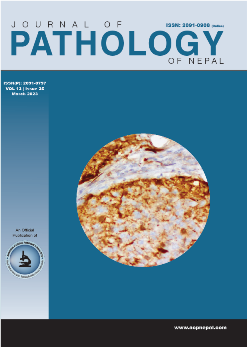Study to determine between HbA1C and C-reactive protein in Diabetes mellitus
DOI:
https://doi.org/10.3126/jpn.v13i1.55583Keywords:
CRP, HbA1c, InflammationAbstract
Background: Studies have shown that C-reactive protein, as an inflammatory marker, is an important risk factor for insulin resistance and type 2 DM. Measurement of inflammatory markers like CRP will improve the prediction of the risk of these events. The aim of this study was to investigate the relationship between hemoglobin A1c, one of the indicators of diabetes, and the highly sensitive C-reactive protein, one of the indicators of inflammation.
Materials and Methods: This prospective observational study was carried out in the Department of Pathology, Patan Hospital. This study included each 154 subjects of Type 2 diabetic patients and healthy control. Statistical analysis was done using Pearson’s correlation test and data was expressed as mean ±SD for each parameter. A p-value of < 0.05 was considered to be significant.
Results: Most (57.7%) of the patients were between 40 to 60 years with a female preponderance of (0.5:1). The HbA1c and CRP values were high in the case group compared to the control group and analysis shows statistical significance. There was a statistically significant association between CRP level in the diabetic group (patient with HbA1C greater than 5.7%) than in the control group (patient with HbA1C equal to or less than 5.7%) (p- Value=0.005).
Conclusions: Higher HbA1c levels are associated with increased CRP, demonstrating that poorly controlled diabetes mellitus is associated with increased systemic inflammation. Timely screening and early detection of elevated CRP in diabetes mellitus patients can prevent further complications and consequences.
Downloads
Downloads
Published
How to Cite
Issue
Section
License
Copyright (c) 2023 Dipti Gautam, Sushil Adhikari, Rojin Thapa, Larisha Kharel, Rojin Thapa

This work is licensed under a Creative Commons Attribution 4.0 International License.
This license enables reusers to distribute, remix, adapt, and build upon the material in any medium or format, so long as attribution is given to the creator. The license allows for commercial use.




